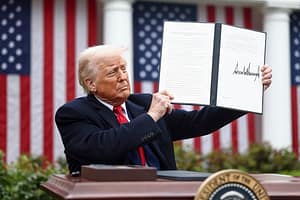Now that Prime Minister Rishi Sunak has called a snap election on July 4, investors and businesses are hoping for one over-riding outcome: a clear winner.
After enduring years of political chaos that have impacted policymaking and financial markets, the business community is eager for a period of stability.
The 2016 Brexit referendum initiated a long stretch of uncertainty, affecting trade, regulatory systems, and economic predictions.
Subsequent general elections and shifts in Conservative leadership further intensified this instability. For businesses and investors, such unpredictability translates directly into market fluctuations and difficulties in strategic planning.
Stable governance is essential for the creation and execution of consistent policies and businesses thrive in environments with predictable regulatory frameworks and steady economic policies.
The lack of stability always causes hesitation in investment decisions, as companies are unsure about future tax policies, trade agreements, and regulatory changes. For investors, political stability equates to reduced risk – a crucial factor, of course, in their investment decisions.
While the policy differences between the Conservatives and Labour may be less significant compared to previous elections, their distinct approaches still have implications for the business environment.
However, the primary concern for businesses and investors is not necessarily which party wins, but that the winning party achieves a clear and functional majority.
A decisive victory would allow the government to implement its policies without constant opposition or the need for continuous negotiations with smaller parties.
To my mind, this ability to govern effectively is more important than the specific policies themselves.
Dangers of a hung parliament
One significant concern raised by Sunak is the potential for a hung parliament. A hung parliament occurs when no single party has a clear majority, leading to coalition or minority governments. This often results in weaker governance and more frequent elections, perpetuating instability. Experts warn that Labour would need a substantial swing, larger than Tony Blair’s 1997 landslide, to secure even a slim majority.
For businesses, a hung parliament means more uncertainty. Key economic policies could be delayed or watered down through prolonged negotiations, and there is a higher risk of abrupt policy changes. Investors see this scenario as likely to increase market volatility and diminish confidence in the UK as a stable investment destination.
Influence of polls and market sentiment
Current polling data shows Labour with a 20-percentage point lead over the Conservatives. However, this lead is not insurmountable, and it could narrow as the election date approaches.
If Labour’s lead decreases and results in only a small majority in the House of Commons, Starmer might struggle to resist pressures from his leftwing MPs, leading to potential internal conflicts and further instability.
The business community and investors are not merely spectators in this electoral process; they are stakeholders whose future decisions will be profoundly influenced by the election’s outcome.
A government with a strong mandate will be better positioned to address the country’s pressing economic issues, drive forward coherent policies, and rebuild confidence in the UK as a stable and reliable partner in the global economy.






Leave a Comment